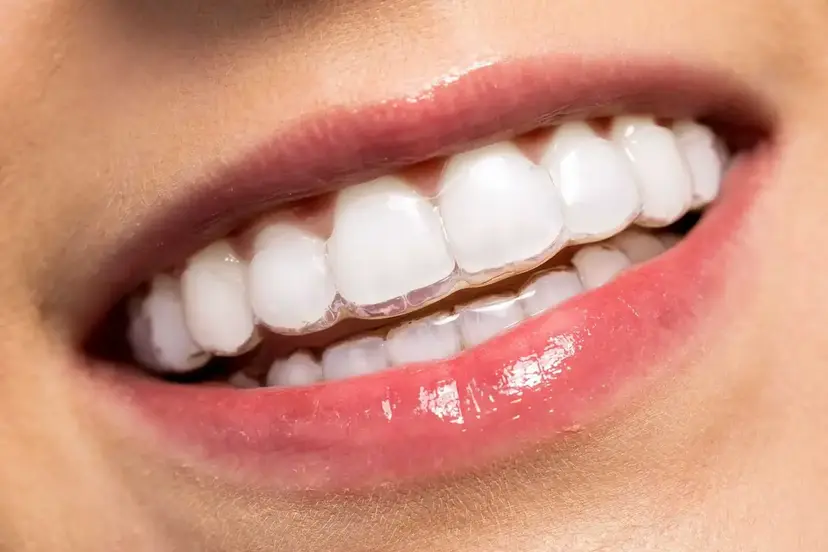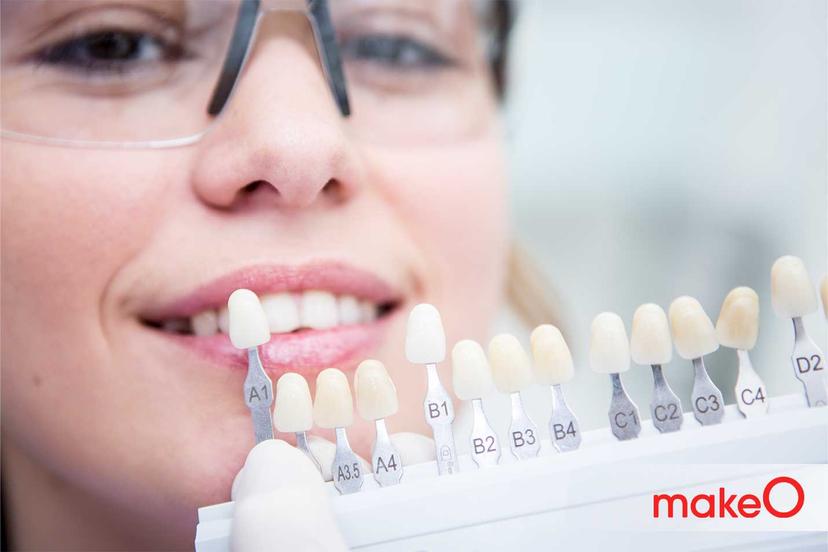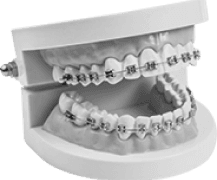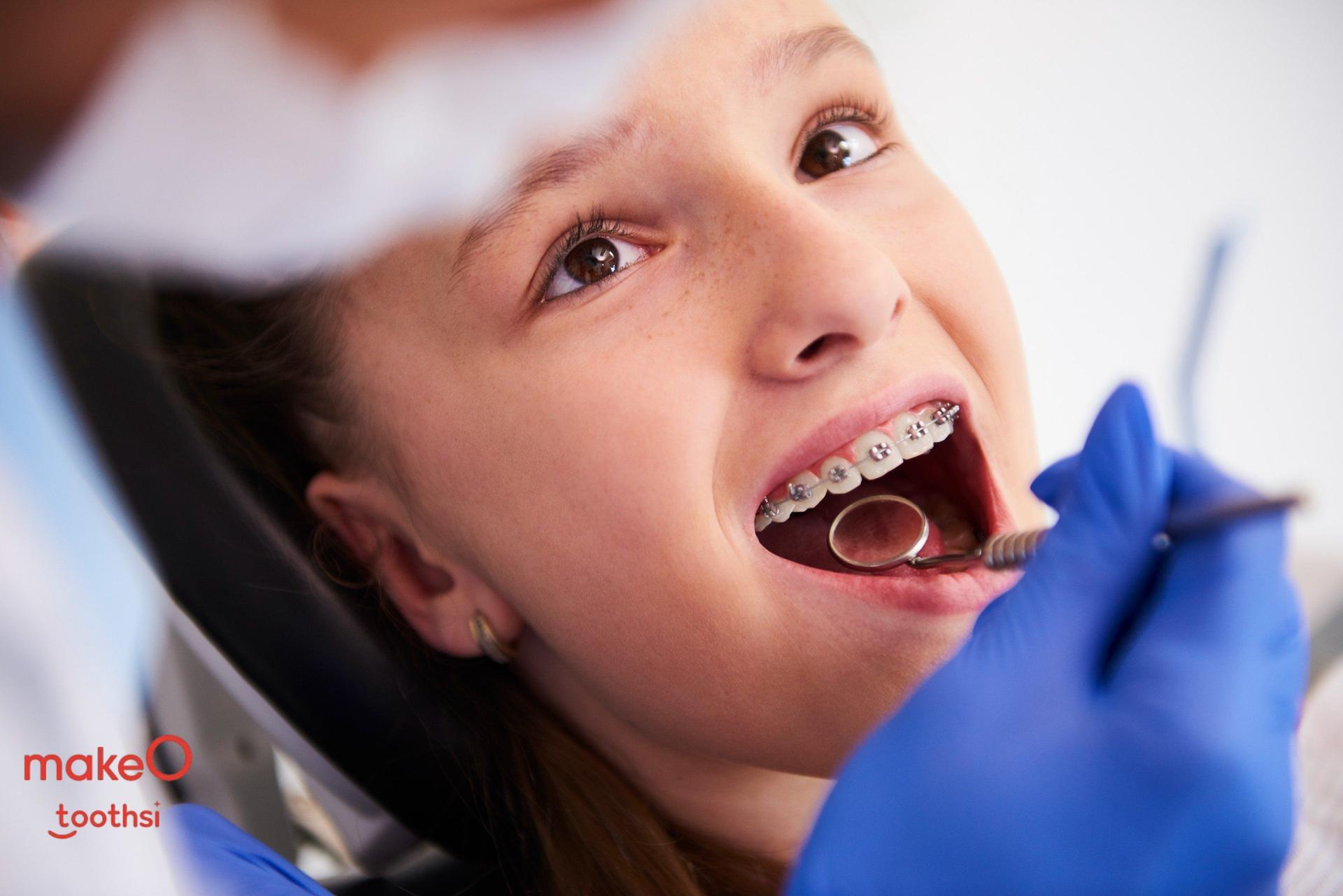MakeO blog
Braces are dental devices used to straighten teeth and fix bite problems. They are made of metal or ceramic brackets connected by wires and bonded to your teeth.1 While they help improve smiles, some people worry about the teeth braces' side effects. They might cause gum irritation, wear down tooth enamel, or lead to plaque buildup, which can create dental issues.2 On the other hand, clear aligners, commonly known as invisible braces for kids or adults, are a gentler option that can straighten teeth with less risk of hurting oral tissues.3 In this blog, we will discuss about the effect of braces on oral tissues, clearing common doubts such as do teeth braces hurt the mouth, and comparing their effects on oral health with those of aligners.
Potential Risks: Common Oral Tissue Reactions
When getting braces for teeth, side effects may occur as your mouth adjusts to the treatment, and it’s essential to be aware of the potential risks involved. Here are some common reactions and issues you might encounter with braces:
Sore Mouth: At first, braces can make your cheeks, lips, and gums sore. The brackets and wires may rub against the inside of your mouth, causing irritation or small cuts. This usually gets better after a few days as your mouth adjusts.
Swollen Gums: Sometimes, the gums can become swollen or bleed a little when you have braces. This can happen if food gets stuck around the brackets, and you don’t clean your teeth well. It’s important to brush and floss carefully to keep your gums healthy. If not looked after in the initial stages, this can lead to major gum disease later.
White Spots on Teeth: Braces can make it easier for plaque (a sticky film of bacteria) to build up on your teeth. If you don’t clean your teeth well, you might notice white spots on your teeth after your braces come off. These spots are early signs of cavities, so brushing well is very important.
Allergic Reactions: Some people might have allergic reactions to the metals in braces, especially nickel. These reactions can cause redness in the mouth, sores, and swollen gums. Common symptoms include itching, a burning feeling, and discomfort.
While braces are effective in straightening your teeth, they can lead to some oral reactions. Practicing good hygiene and going for regular orthodontic visits are vital for preventing and managing these issues, ensuring a smoother treatment experience.
Long-Term Effects: Braces and Oral Health
Braces have a significant long-term impact on oral health, with both benefits and some drawbacks.
On the positive side, braces help straighten teeth, which improves how they bite together. This alignment reduces the risk of damaging teeth and makes it easier to clean them, which lowers the chances of cavities and gum disease. When teeth are straight, they also look better, boosting confidence and making social interactions more enjoyable.
However, there are some braces side effects to consider in the long run. One potential issue is that braces can cause tooth roots to resorb due to constant pressure on teeth. This does not cause pain but can lead to the teeth becoming non-vital that can potentially cause infection and swelling at a later stage. Also, this can affect how well the teeth stay in place as time goes on. Moreover, due to plaque accumulation braces can lead to gum disease and recession which can cause teeth sensitivity and loosening eventually. Other concerns with braces include possible jaw joint problems, muscle pain and changes in bone density due to the constant pressure.
Additionally, if retainers are not used properly after braces, teeth may shift back to their original positions, reducing the benefits of treatment.
To maintain good oral health and the results achieved from braces, proper oral hygiene maintenance and regular dental check-ups are essential. This helps ensure teeth stay healthy and properly aligned over time.
Aligners vs Braces for Oral Health
While braces play a crucial role in straightening teeth, dental braces side effects like discomfort, irritation and other long-term effects on oral health are also common. Additionally, maintaining proper oral hygiene can be challenging, as food particles often become trapped in the brackets and wires, increasing the risk of tooth decay and gum disease.
Aligners or Invisible braces for adults and kids are a popular alternative. These are clear, custom-made trays that fit over your teeth and gradually shift them into the right position. Aligners are generally more comfortable because they don’t have brackets or wires that can irritate your mouth. Compared to braces it is easier to maintain good oral hygiene for those using aligners, as it can be removed while eating and brushing.
Although aligners cause lesser discomfort and deleterious impact on oral tissues, choosing between braces and aligners depends on your specific needs and preferences.
Conclusion
Braces are an effective way to straighten teeth and improve bite alignment, but they come with some risks to oral health, such as soreness, gum irritation, plaque buildup, and possible allergic reactions. On the other hand, aligners provide a more comfortable alternative, reducing these risks because they are removable and easier to clean. It’s crucial to consult your orthodontist to determine the best option for your specific needs and achieve a beautiful, healthy smile.
FAQs
1. Do dental braces hurt?
Yes, dental braces can hurt a bit, especially after getting them adjusted. The pain usually gets worse in the first day or two but gets better as your mouth gets used to them.
2. Pain relief braces?
Over-the-counter pain medications, cold compresses, and soft foods can help relieve pain. Consult your orthodontist for specific recommendations.
3. How much do braces hurt on a scale of 1-10?
The pain associated with getting braces varies among individuals. On a scale of 1 to 10, most people rate the initial discomfort between 3 and 5. Several factors can influence the level of pain experienced during treatment
4. How long does braces pain last?
Braces pain usually lasts about 3 to 7 days after they are put on or adjusted. The most discomfort is felt on the second or third day.
5. Do braces hurt the first day?
Yes, braces can hurt on the first day. Most people feel discomfort as their teeth adjust to the braces, and this discomfort usually peaks within the first few days.
6. How long does braces soreness last?
Brace soreness typically lasts for about 3 to 5 days when first getting braces or after adjustments, gradually decreasing after that.
7. Teeth sensitivity after braces?
After braces, teeth sensitivity can arise, often due to gum recession. This sensitivity can affect quality of life, but desensitizing toothpaste may help reduce discomfort.
8. How to make braces hurt less?
To reduce discomfort, use orthodontic wax on brackets, take pain relievers, eat soft foods, and apply cold compresses.
9. Do invisible aligners hurt?
Yes, pain can happen after getting aligners. It’s usually mild and temporary, peaking in the first few days as your teeth adjust, but it goes away quickly.3
Toothsi offers India’s leading aligner treatment, providing top-quality results and a comfortable experience. Discover Toothsi aligners and start your journey to a perfect smile here!
10. How do braces feel in your mouth?
Braces feel tight and uncomfortable at first, causing soreness in your gums and teeth. This discomfort usually eases after a few days, but you might still feel some pressure.
related categories
Related articles

Types of Braces: Removable vs Fixed Braces, Which is Right For You?

This Diwali, Smile Bright With makeO Teeth Whitening Kit

Dr. Pravin Shetty: Pioneer in Lingual Orthodontics & Innovative Smile Solutions
How do I Know I’m the Right Candidate for makeO toothsi Teeth Aligners?

